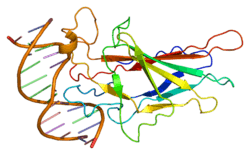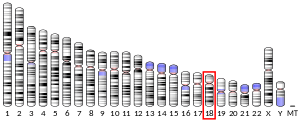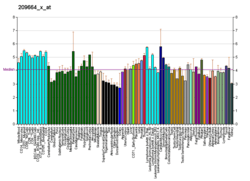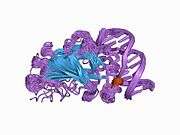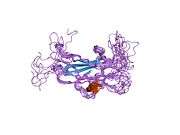NFATC1
Nuclear factor of activated T-cells, cytoplasmic 1 is a protein that in humans is encoded by the NFATC1 gene.[5]
Function
The product of this gene is a component of the nuclear factor of activated T cells DNA-binding transcription complex. This complex consists of at least two components: a preexisting cytosolic component that translocates to the nucleus upon T cell receptor (TCR) stimulation, and an inducible nuclear component. Proteins belonging to this family of transcription factors play a central role in inducible gene transcription during immune response. The product of this gene is an inducible nuclear component. It functions as a major molecular target for the immunosuppressive drugs such as ciclosporin. Five transcript variants encoding distinct isoforms have been identified for this gene. Different isoforms of this protein may regulate inducible expression of different cytokine genes.[6]
Interactions
NFATC1 has been shown to interact with PIM1.[7]
See also
References
- GRCh38: Ensembl release 89: ENSG00000131196 - Ensembl, May 2017
- GRCm38: Ensembl release 89: ENSMUSG00000033016 - Ensembl, May 2017
- "Human PubMed Reference:". National Center for Biotechnology Information, U.S. National Library of Medicine.
- "Mouse PubMed Reference:". National Center for Biotechnology Information, U.S. National Library of Medicine.
- Northrop JP, Ho SN, Chen L, Thomas DJ, Timmerman LA, Nolan GP, Admon A, Crabtree GR (Jun 1994). "NF-AT components define a family of transcription factors targeted in T-cell activation". Nature. 369 (6480): 497–502. Bibcode:1994Natur.369..497N. doi:10.1038/369497a0. PMID 8202141.
- "Entrez Gene: NFATC1 nuclear factor of activated T-cells, cytoplasmic, calcineurin-dependent 1".
- Rainio EM, Sandholm J, Koskinen PJ (Feb 2002). "Cutting edge: Transcriptional activity of NFATc1 is enhanced by the Pim-1 kinase". Journal of Immunology. 168 (4): 1524–7. doi:10.4049/jimmunol.168.4.1524. PMID 11823475.
Further reading
- Rao A, Luo C, Hogan PG (1997). "Transcription factors of the NFAT family: regulation and function". Annual Review of Immunology. 15: 707–47. doi:10.1146/annurev.immunol.15.1.707. PMID 9143705.
- Crabtree GR (Mar 1999). "Generic signals and specific outcomes: signaling through Ca2+, calcineurin, and NF-AT". Cell. 96 (5): 611–4. doi:10.1016/S0092-8674(00)80571-1. PMID 10089876.
- Horsley V, Pavlath GK (Mar 2002). "NFAT: ubiquitous regulator of cell differentiation and adaptation". The Journal of Cell Biology. 156 (5): 771–4. doi:10.1083/jcb.200111073. PMC 2173310. PMID 11877454.
- Tolstrup M, Ostergaard L, Laursen AL, Pedersen SF, Duch M (Apr 2004). "HIV/SIV escape from immune surveillance: focus on Nef". Current HIV Research. 2 (2): 141–51. doi:10.2174/1570162043484924. PMID 15078178.
- Li X, Ho SN, Luna J, Giacalone J, Thomas DJ, Timmerman LA, Crabtree GR, Francke U (1995). "Cloning and chromosomal localization of the human and murine genes for the T-cell transcription factors NFATc and NFATp". Cytogenetics and Cell Genetics. 68 (3–4): 185–91. doi:10.1159/000133910. PMID 7842733.
- Jabado N, Le Deist F, Fisher A, Hivroz C (Nov 1994). "Interaction of HIV gp120 and anti-CD4 antibodies with the CD4 molecule on human CD4+ T cells inhibits the binding activity of NF-AT, NF-kappa B and AP-1, three nuclear factors regulating interleukin-2 gene enhancer activity". European Journal of Immunology. 24 (11): 2646–52. doi:10.1002/eji.1830241112. PMID 7957556.
- Vacca A, Farina M, Maroder M, Alesse E, Screpanti I, Frati L, Gulino A (Nov 1994). "Human immunodeficiency virus type-1 tat enhances interleukin-2 promoter activity through synergism with phorbol ester and calcium-mediated activation of the NF-AT cis-regulatory motif". Biochemical and Biophysical Research Communications. 205 (1): 467–74. doi:10.1006/bbrc.1994.2689. PMID 7999066.
- Park J, Takeuchi A, Sharma S (Aug 1996). "Characterization of a new isoform of the NFAT (nuclear factor of activated T cells) gene family member NFATc". The Journal of Biological Chemistry. 271 (34): 20914–21. doi:10.1074/jbc.271.34.20914. PMID 8702849.
- Di Somma MM, Majolini MB, Burastero SE, Telford JL, Baldari CT (Sep 1996). "Cyclosporin A sensitivity of the HIV-1 long terminal repeat identifies distinct p56lck-dependent pathways activated by CD4 triggering". European Journal of Immunology. 26 (9): 2181–8. doi:10.1002/eji.1830260933. PMID 8814265.
- Beals CR, Sheridan CM, Turck CW, Gardner P, Crabtree GR (Mar 1997). "Nuclear export of NF-ATc enhanced by glycogen synthase kinase-3". Science. 275 (5308): 1930–4. doi:10.1126/science.275.5308.1930. PMID 9072970.
- Kinoshita S, Su L, Amano M, Timmerman LA, Kaneshima H, Nolan GP (Mar 1997). "The T cell activation factor NF-ATc positively regulates HIV-1 replication and gene expression in T cells". Immunity. 6 (3): 235–44. doi:10.1016/S1074-7613(00)80326-X. PMID 9075924.
- Zhou P, Sun LJ, Dötsch V, Wagner G, Verdine GL (Mar 1998). "Solution structure of the core NFATC1/DNA complex". Cell. 92 (5): 687–96. doi:10.1016/S0092-8674(00)81136-8. PMID 9506523.
- Kinoshita S, Chen BK, Kaneshima H, Nolan GP (Nov 1998). "Host control of HIV-1 parasitism in T cells by the nuclear factor of activated T cells". Cell. 95 (5): 595–604. doi:10.1016/S0092-8674(00)81630-X. PMID 9845362.
- Chuvpilo S, Zimmer M, Kerstan A, Glöckner J, Avots A, Escher C, Fischer C, Inashkina I, Jankevics E, Berberich-Siebelt F, Schmitt E, Serfling E (Feb 1999). "Alternative polyadenylation events contribute to the induction of NF-ATc in effector T cells". Immunity. 10 (2): 261–9. doi:10.1016/S1074-7613(00)80026-6. PMID 10072078.
- Chuvpilo S, Avots A, Berberich-Siebelt F, Glöckner J, Fischer C, Kerstan A, Escher C, Inashkina I, Hlubek F, Jankevics E, Brabletz T, Serfling E (Jun 1999). "Multiple NF-ATc isoforms with individual transcriptional properties are synthesized in T lymphocytes". Journal of Immunology. 162 (12): 7294–301. PMID 10358178.
- Wang JK, Kiyokawa E, Verdin E, Trono D (Jan 2000). "The Nef protein of HIV-1 associates with rafts and primes T cells for activation". Proceedings of the National Academy of Sciences of the United States of America. 97 (1): 394–9. Bibcode:2000PNAS...97..394W. doi:10.1073/pnas.97.1.394. PMC 26674. PMID 10618429.
- Porter CM, Havens MA, Clipstone NA (Feb 2000). "Identification of amino acid residues and protein kinases involved in the regulation of NFATc subcellular localization". The Journal of Biological Chemistry. 275 (5): 3543–51. doi:10.1074/jbc.275.5.3543. PMID 10652349.
External links
- NFATC1+protein,+human at the US National Library of Medicine Medical Subject Headings (MeSH)
This article incorporates text from the United States National Library of Medicine, which is in the public domain.
